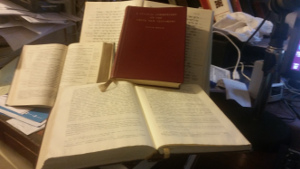Quick Thoughts after Reading Different Greek Texts
 Yesterday I read a few chapters (4 actually) of Hebrews with Stephen’s Textus Receptus (1550) beside my NA27, both from Logos Bible Software. It was an interesting exercise. I noticed a few things I hadn’t noticed before and was reminded of some things I know, but can easily neglect.
Yesterday I read a few chapters (4 actually) of Hebrews with Stephen’s Textus Receptus (1550) beside my NA27, both from Logos Bible Software. It was an interesting exercise. I noticed a few things I hadn’t noticed before and was reminded of some things I know, but can easily neglect.
I started into biblical languages to get past the gatekeepers. I wanted to read the original text for myself and discover what was there without depending on others. In that goal I failed. It’s amazing the number of little things you can notice when you look at different edited texts. And that is what our Greek New Testaments these days are. (I’ll stick with discussing the Greek, though I could make similar, but not identical, points about Hebrew.) Someone studies the manuscripts available, or existing editions, or starts with an edition and just looks at particular variants, and produces a text which I then read. I can take the Nestle-Aland 27th edition text and read it from their edition, or from the UBSIV Bible I also have which uses the same text. They list different variants. Why? Because the editors determine that for the purposes of this edition, those are the variants you need to see.
Now it happens I’m fairly happy with most of their choices, though one reason I have various editions is so that I can check on other details. In my reading yesterday, for example, I noticed quite a number of differences in word order. It would be quite a daunting task to cover all those differences in a textual apparatus, but they might actually be meaningful. I’m very careful doing so, but I have been known to argue emphasis based on word order. Do I have the right word order?
My point is not to make one feel helpless. Rather, I think we should be thankful to those who have gone to the work to provide us with these tools. I’m thankful that I can read my Greek New Testament in an edition that combines information from thousands of sources and then gives me notes on a selected set of the most important variants. Hebrews 12:1 has its crowd of witnesses. Whenever I study the Bible, I am standing on a substantial pyramid of other peoples’ shoulders.
At the same time I have to remember that there is a time to get out of the rut of the ordinary and to look at things that are substantially different. I’m now interested in studying variations in word order, though I doubt I will ever have the time. Nonetheless, it looks like a field that could be fascinating to research and study.
Lessons? 1) Always go for the source, even if you won’t really get there. 2) Be thankful to those who have gone before!


